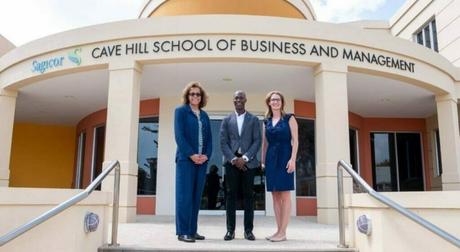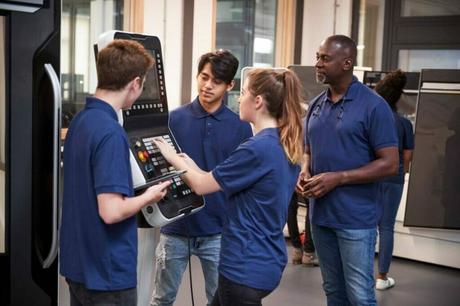When you think of Barbados, your mind might automatically drift to the clear blue sea, the golden beaches, the enchanting calypso rhythms, and the world-renowned Mount Gay Rum. However, Barbados is more than just a tropical paradise. It’s a nation with a rich history and a burgeoning economy that’s currently standing on the precipice of potential transformation.
How so?
It’s all about focusing on the most valuable resource we have – our people.
The Current State of Barbados’ Economy

Barbados has established a reputation for having a strong economy in the Caribbean despite its small size. Its economy, once heavily reliant on sugar production, has diversified into tourism, light manufacturing, and the financial sector.
Still, like all economies, it faces its unique challenges. Rising cost of living, high levels of public debt, and a fragile tourism sector susceptible to global economic fluctuations are among them.
Nonetheless, just as the resilient spirit of the Bajan people saw them through the transition from a plantation-based economy, there is a growing consensus that the key to future economic stability lies in the development of our human resources.
Education: The Cornerstone of Barbados Human Resource Development

“Knowledge is power” isn’t just a saying – it’s the compass that directs the course of nations. Education, particularly higher education, has always been the cornerstone of human resource development.
Barbados has already laid a strong foundation with a literacy rate exceeding 98%, one of the highest in the world.
Take the University of the West Indies (UWI) Cave Hill Campus, for example. It’s an institution that has continuously churned out graduates equipped with the skills and knowledge to serve not only Barbados but the entire Caribbean region. It demonstrates the nation’s dedication to education.
But is this enough?
Quite simply, the answer is no.
As global economies evolve and industries transform, the demand for new skills and competencies grows. Our educational system must keep up, emphasizing the development of students’ technical knowledge and soft skills in order to help them succeed in a rapidly evolving labor market.
Investing in Skills Training and Lifelong Learning

To truly leverage our ‘Barbados Human Resource’, we need to invest more in skills training and lifelong learning initiatives. While academic education is crucial, not everyone will, or even should, take the university route. Vocational and technical training institutions should be given equal importance.
A step in the right direction are initiatives like the Inter-American Development Bank (IDB) and the Government of Barbados’ Skills for the Future Program. They provide training and certification in various fields, from renewable energy to culinary arts, directly contributing to the diversification of skills among the Barbadian workforce.
Harnessing Technology and Innovation

Technology and innovation are now essential in the age of the digital revolution. By embracing technology in our education and training systems, we can prepare our workforce for the future.
Digital literacy should be a required component of the curriculum, and coding and programming should be introduced to children at a young age.
The example of the Barbados Coding Academy, a government initiative to provide free coding and software development training, is noteworthy here. It illustrates how the government is taking proactive steps to bridge the digital skills gap.
The Role of Private Sector and Government

The responsibility of nurturing ‘Barbados Human Resource’ doesn’t fall solely on the government. Additionally, the private sector has a sizeable part to play.
By offering opportunities for internships, apprenticeships, and on-the-job training, businesses can support this effort. They should also collaborate with educational institutions to ensure the curriculum aligns with the skills and competencies they seek in their employees.
One shining example is the collaboration between Bitt Inc., a Barbadian fintech company, and UWI. They established the Bitt Digital Scholars program, which provides scholarships for students pursuing studies in computer science or related fields. Companies benefit from having access to a skilled workforce, and students benefit from real-world experience and job opportunities.
The government, on the other hand, must ensure a supportive regulatory environment that encourages such partnerships. It should also keep making infrastructure investments, especially in digital infrastructure, to support teleworking and remote learning, both of which are becoming more and more crucial in the post-pandemic world.
Facing the Challenges Head-On

Transforming a nation’s human resource landscape is no small feat. It comes with its fair share of obstacles. But, as they say, every challenge presents an opportunity. Let’s take a look at the key challenges and potential solutions:
Challenge 1: Limited Resources for Education and Training
While Barbados is committed to developing its human resources, it operates within a resource-constrained environment. The solution? Strengthen partnerships with international organizations and the private sector to boost funding for education and training programs.
Challenge 2: Aligning Education With Market Needs
The skills that are taught in schools and the ones that employers demand can differ. The answer lies in strengthening collaboration between educational institutions and the private sector to ensure curriculum alignment with market needs.
Challenge 3: Bridging the Digital Divide
Access to technology and digital literacy are crucial in today’s world. Yet, not everyone has equal access. To bridge this gap, the government should invest more in digital infrastructure and promote digital literacy initiatives, especially in disadvantaged communities.
Challenge 4: Overcoming Resistance to Change
Change, especially in the education sector, can face resistance from various quarters. All interested parties must be included in the decision-making process in order to address this, and the advantages of the suggested changes must be effectively communicated.
Despite the sizeable nature of each of these obstacles, none is insurmountable. With a collective, concerted effort, we can turn these challenges into stepping stones towards a more prosperous and resilient Barbadian economy.
Inspiring Success Stories

Success stories act as potent reminders of the potential positive effects that education and the development of human resources can have on people’s lives and, consequently, the economy. Let’s take a look at some inspiring examples from Barbados:
- Case Study 1: Shaping a Renewable Energy Pioneer
Ralph “Bizzy” Williams is a well-known figure in Barbados. He began his career as a painter and gradually built a diverse business empire. In recent years, he has become a pioneer in renewable energy through his company, Williams Industries Inc. His journey is an excellent example of how skills training and lifelong learning can lead to innovation and economic diversification. - Case Study 2: From Culinary Student to Renowned Chef
Chef Peter Edey is a household name in the Barbadian culinary scene. Starting as a student at the Barbados Community College’s Hospitality Institute, he honed his skills and passion for Bajan cuisine. Today, he’s not only a renowned chef but also a mentor for many young aspiring chefs, demonstrating the transformative power of vocational education. - Case Study 3: Coding the Future
A young woman named Shari, a graduate of the Barbados Coding Academy, perfectly illustrates the potential of technology education. Coming from a non-technical background, she enrolled in the Academy’s program, and today, she’s a successful software developer in a leading tech firm. This showcases how embracing technology in education can open up new career pathways. - Case Study 4: Nurturing Homegrown Talent in Fintech
Bitt Inc., a Barbadian fintech company, has been instrumental in nurturing local talent. One such individual is Marla, who started as an intern and, thanks to the company’s continuous training and development opportunities, has grown into a key team leader. Marla’s story highlights the role of the private sector in human resource development.
Each of these stories underscores the enormous potential within our ‘Barbados Human Resource.’ It’s these individuals, equipped with skills, resilience, and a passion for growth, who will drive the Barbadian economy forward.
FAQ

What Is The Barbados Human Resource Development Strategy?
The Barbados Human Resource Development Strategy is a holistic approach that seeks to create a globally competitive, flexible workforce. To increase productivity and economic growth, it focuses on enhancing the quality of education and training, fostering innovation, and promoting lifelong learning. The strategy is implemented through various initiatives, including skills training programs, education reforms, and public-private partnerships.
What Are A Country’s Human Resources?
A country’s human resources refer to its population’s collective skills, knowledge, talents, and abilities. The growth and development of the economy depend heavily on these assets, which are acquired through education, training, and experience. Human resources are vital for all sectors, from agriculture to technology, contributing to productivity, innovation, and competitiveness.
Who Is The Director General Of Human Resources In Barbados?
As of my knowledge cutoff in September 2021, the specific position of ‘Director General of Human Resources’ in Barbados is not mentioned in available sources. The Barbados government’s human resource functions are typically overseen by the Ministry of the Civil Service, but the individual officials may change. For the most current information, it’s recommended to refer to the official Barbados government resources.
Barbados Human Resource Development: The Way Forward

Ultimately, the key to building a stronger Barbadian economy lies in recognizing that our most valuable asset is our people. We must adopt a holistic approach to human resource development, one that doesn’t just focus on traditional academic education but also values vocational training, technological competence, and lifelong learning.
In a nutshell, “Barbados Human Resource” is about having a diverse, skilled, and adaptable workforce rather than just having an educated workforce that can promote innovation, productivity, and economic growth.
We must remember that economic development is not a destination but a journey. And on this journey, our people are our compass and our vehicle. So let’s invest in them, believe in them, and most importantly, empower them. Because when our people thrive, Barbados thrives.

